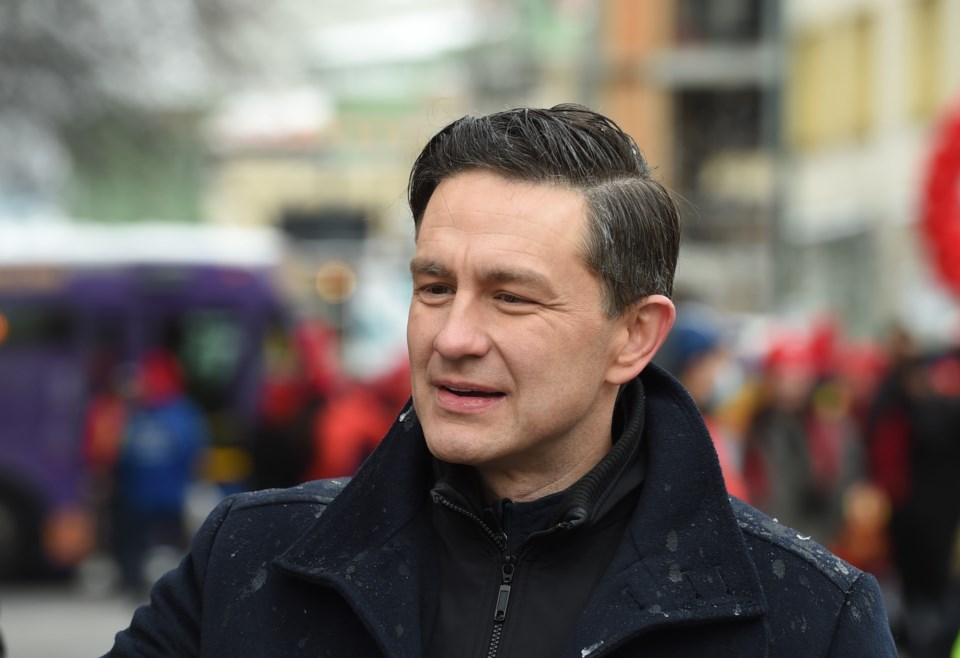The B.C. government is dismissing a new promise by federal Conservative Leader Pierre Poilievre to fast-track Phase 2 of the enormous LNG Canada project near Kitimat, saying it’s nothing more than election rhetoric.
Energy Minister Adrian Dix said Ottawa has no role left in approving Phase 2 of LNG Canada, because the project received joint federal and provincial environmental permits in 2015.
“The decision as to whether LNG Canada proceeds with the second phase is largely a decision from them,” he said of the company. “That's a sort of a budgetary investment decision for them.”
Poilievre referenced the $40 billion export terminal on Monday, which is 95 per cent complete and will export 14 million tonnes of natural gas overseas. He said doubling capacity with a second phase is critical to Canada’s economy, could create hundreds of new jobs, produce new revenue, and benefit the economy at a time of trade uncertainty with the United States.
Poilievre said he would not subject Phase 2 to the federal Liberal government’s oil and gas emissions cap, which could block the project if it proceeds with cheaper but higher-emission natural-gas powered turbines instead of electricity.
“The project will not go ahead if it cannot run on natural gas,” Poilievre said. “It won’t happen. So when the Liberals say that they’re going to ban LNG Canada from using gas to power the plant, what they’re saying is the plant will not be allowed to happen.”
He said the cap on emissions for the oil and gas sector “makes it impossible” to proceed with Phase 2, as does the industrial carbon tax.
“If you want energy independence, if you want these monstrous, big, beautiful projects to go ahead, you are going to need a change in government,” said Poilievre.
The B.C. government also has a requirement for major projects to be net-zero on emissions by 2030, but relaxed that rule last week for projects where it’s not possible to connect to enough electricity capacity. The province is currently planning a $3-billion expansion to the northwest transmission line to help connect projects like LNG Canada and reduce their greenhouse gas emissions.
Dix said LNG Canada’s Phase 2 would not have to meet provincial net-zero requirements because its permits were approved as part of a joint federal-provincial process prior to the rule.
“That requirement was put in place for new projects,” he said.
Nor is LNG Canada required to use electricity in Phase 2, because its permits already cite natural gas turbines.
“The project is already permitted and it's permitted as a gas-fired project,” said Dix. “So he's factually incorrect.”
A briefing note for the energy minister in 2023 confirmed “LNG Canada has all the necessary permits they need to build Phase 2” and that “these permits allow for use of gas-fired turbines to power two additional trains at the site in Kitimat.”
Provincial officials were hopeful LNG Canada was considering a phased electrification approach for Phase 2, as well as retrofitting Phase 1 and some compressor stations with electricity, but those talks were preliminary, according to the briefing note.
“Our proposed Phase 2 expansion is permitted for gas-powered turbines and could proceed as such, in the event our five joint venture participants (JVPs) reach a positive final investment decision for Phase 2,” LNG Canada vice-president Teresa Waddington said in a statement Monday.
“The focus for LNG Canada and our JVPs is finding a pathway to a final investment decision that takes into account overall competitiveness, affordability, pace, future GHG emissions and stakeholder needs.
“We don’t rule out the possibility of replacing Phase 2 gas turbines with electric drive turbines at some point, but a number of developments need to take place, including an expansion of the province’s hydroelectric grid capacity, before a timeline is contemplated.”
Poilievre on Monday also proposed a joint “one-stop shop” for permitting from all levels of government, including First Nations, with a cap on approval times of within a year.
B.C. has also been moving towards a “single window” for permitting in housing, transmission lines, wind and solar projects. Premier David Eby has also promised to bring in new benchmarks for mining permits. In some major projects, the federal and provincial environmental assessments are already combined.
“We're moving and changing to a one-window approach on transmission projects on all renewable energy projects,” said Dix.
“So I'm glad that Mr. Poilievre has read what we're doing in British Columbia, and hopefully he reads a little more so he's a little better informed.”
Rob Shaw has spent more than 17 years covering B.C. politics, now reporting for CHEK News and writing for Glacier Media. He is the co-author of the national bestselling book A Matter of Confidence, host of the weekly podcast Political Capital, and a regular guest on CBC Radio.
🚨New newsletter alert! Stay ahead of the curve in B.C. politics. Get expert political analysis delivered straight to your inbox, plus inside scoops and other stories from across the province.
Sign up here for the Capital & Coast newsletter.
Updated April 8, 2025, to reflect Poilievre did not tour the facility in Kitimat.




